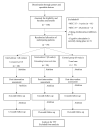[Effects of a personalised, adapted computerised cognitive stimulation programme versus stimulating leisure activities in younger and older adults with mild or subjective cognitive impairment. Protocol for a randomised controlled trial]
- PMID: 40326579
- PMCID: PMC12121461
- DOI: 10.23938/ASSN.1118
[Effects of a personalised, adapted computerised cognitive stimulation programme versus stimulating leisure activities in younger and older adults with mild or subjective cognitive impairment. Protocol for a randomised controlled trial]
Abstract
Background:: Mild cognitive impairment represents a transitional stage between healthy aging and dementia, with subjective cognitive impairment being a key predictor of progression to dementia. This randomized controlled trial aims to compare the effectiveness of a personalized computerized cognitive stimulation program with that of stimulating leisure activities in younger and older adults with mild or subjective cognitive impairment.
Methods:: Participants aged ≥ 50 with mild cognitive impairment and subjective cognitive impairment or scores between 24 and 31 on the Spanish Mini-Mental State Examination were recruited. Exclusion criteria comprised living in residential care, use of acetylcholinesterase inhibitors, sensory impairments, agitation, or having received cognitive stimulation in the past 12 months. Fifty-nine community-dwelling individuals in Zaragoza, Spain, were randomly assigned to an two interventions group or a control group. The first intervention group will receive personalized computerized cognitive stimulation for 30 minutes per day, five days per week, while the second intervention group will participate in two to five stimulating leisure activities. The intervention will last eight weeks. The control group will receive the usual care for the same duration. The primary outcome is the assessment of global cognition; secondary outcomes include memory, verbal fluency, activities of daily living, and mood.
Figures
Similar articles
-
Rationale and protocol of the ENGAGE study: a double-blind randomized controlled preference trial using a comprehensive cohort design to measure the effect of a cognitive and leisure-based intervention in older adults with a memory complaint.Trials. 2019 May 22;20(1):282. doi: 10.1186/s13063-019-3250-6. Trials. 2019. PMID: 31118095 Free PMC article.
-
Computerised cognitive training for preventing dementia in people with mild cognitive impairment.Cochrane Database Syst Rev. 2019 Mar 13;3(3):CD012279. doi: 10.1002/14651858.CD012279.pub2. Cochrane Database Syst Rev. 2019. PMID: 30864747 Free PMC article.
-
Cognitive training for people with mild to moderate dementia.Cochrane Database Syst Rev. 2019 Mar 25;3(3):CD013069. doi: 10.1002/14651858.CD013069.pub2. Cochrane Database Syst Rev. 2019. PMID: 30909318 Free PMC article.
-
Computerised cognitive training for 12 or more weeks for maintaining cognitive function in cognitively healthy people in late life.Cochrane Database Syst Rev. 2020 Feb 27;2(2):CD012277. doi: 10.1002/14651858.CD012277.pub3. Cochrane Database Syst Rev. 2020. PMID: 32104914 Free PMC article.
-
Cognitive training interventions for dementia and mild cognitive impairment in Parkinson's disease.Cochrane Database Syst Rev. 2020 Feb 26;2(2):CD011961. doi: 10.1002/14651858.CD011961.pub2. Cochrane Database Syst Rev. 2020. PMID: 32101639 Free PMC article.
References
-
- Nichols E, Steinmetz JD, Vollset SE, Fukutaki K, Chalek J, Abd-Allah F, et al. Estimation of the global prevalence of dementia in 2019 and forecasted prevalence in 2050: An analysis for the Global Burden of Disease Study 2019. Lancet Public Healh. 2022;7(2):e105–e125. doi: 10.1016/S2468-2667(21)00249-8. - DOI - PMC - PubMed
Publication types
MeSH terms
LinkOut - more resources
Full Text Sources
Medical
Miscellaneous

